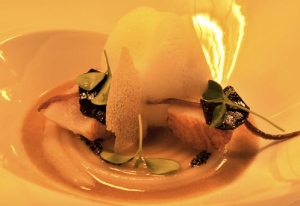Third Generation: Emancipation towards a “New German Cuisine”
Given this background and the reputation of German Fine Dining to be classic with some individual touch what changed? In my opinion there are several developments which contributed to a foundation to a “New German Cuisine”:
- Chefs’ emancipation. After mastering the classic repertoire and using this a solid basis some young chefs began experimenting to develop a personal handwriting surely fueled by some stimulation from all over the world. Klaus Erfort, for example, said he continuously simplified his dishes by getting rid of unnecessary elements and abiding with “variations of…”. “It just happened” – there was no master plan.
- “Rediscovery” of German products. Traditionally German top chefs used the usual suspects like Brittany lobster and turbot, lamb from the Pyrenees, Atlantic sole, etc. In recent years some superb products of German origin made their way on the menus, e.g. Müritz lamb from the former TV journalist Klaus Schwagrzinna, Schwäbisch-Hällisches Landschwein (a premier pork quality), Bœuf de Hohenlohe and herbs from the Essbaren Landschaften to name just a few. Joachim Wissler was one of the first to reintroduce pork at three star level. Yes, there is some way to go but it’s moving in the right direction. Especially for the lower end of fine dining I continuously advocate the use of local products to differentiate form the high-end and become economically more viable.
- Increased public interest in higher-quality cooking and dining. From a rather homogeneous group of fans of simple cuisine (“gutbürgerlich”) there has been some “market segmentation”: On the one hand, some people are increasingly interested in healthier nutrition (mega trend health!) and more natural ingredients (hormone scandals!), do cook more (fueled by those TV chefs) and tend to dine out more. Interestingly, this is not restricted to the wealthy but encompasses also normal middle-class households who save their money to dine 2-3 times in a starred restaurant (like Heston Blumenthal who sold his car to eat at the best restaurants). On the other hand people don’t cook any more and are frequent visitors to fast food chains.
Let me now introduce you to some of the protagonists:
On the forefront of developing a German approach to Fine Dining is clearly Joachim Wissler. When he got his third star in 2005 his cooking was rather classic but made a huge leap forward in recent years. Now he is internationally regarded as one of the best chefs in the world (see the first review on Lo Mejor and the highest new entry on the Pellegrino list at rank 34). His cuisine is the most intellectual in Germany using the whole spectrum of techniques and continuously pushing the frontier. Wissler was recently voted best chef in Germany his Top100 peers.
Juan Amador is the most vanguard cook these days in Germany. At his Restaurant Amador in Langen near Frankfurt he received the third star in November 2007. Equipped with excellent cooking skills he is a master in creating new taste sensations by combining very unusual flavours and using modern culinary techniques to enhance the dish where necessary. This third star is surely a landmark for the further development in Germany as now young chefs should be eager to develop their own handwriting off the beaten track.
Christian Bau also got rid of the chains of his master Wohlfahrt – his cooking is complex, refined, tasty and just pure fun using the best products available. There is an immense potential…
Klaus Erfort is the last of the Wohlfahrt school who earned three stars in 2007. He made a quantum leap from 2005 to 2007 – from playful overloaded plates to reduced and intelligent dishes where only a limited amount of flavours are pulling the strings.
Sven Elverfeld has emanzipated himself completely from Dieter Müller and is very modern with respect to new and very creative interpretations of international and German classics. He should get his third star soon.

Elverfeld: Structuralistic, Innovative and Perfect Harmony
Last, but not least, Dieter Müller’s successor Nils Henkel is currently paving his way to modernize the cuisine in Lerbach – not yet visited, but hopefully soon… And, there are more: Thomas Bühner, Christian Jürgens, Christian Lohse, Thomas Kellermann, and the formidable Michael Kempf among others…
In the end, the question is whether there really is ONE “New German Cuisine”? Given the quite different styles I would rather say there are different interpretations – go and see yourself! Everyone is definitely worth a visit – hopefully my forthcoming reviews of recent visits will be helpful to guide you a little bit. Moreover, I hope to discover some raw diamonds…
***UPDATE Nov 2008***
Third star for Sven Elverfeld as I predicted;-) Very well-deserved for his quite unique and witty style of modernizing German classics and playing with childhood memories. A new report will come up soon – I promise!
Loss of third star for Winkler again as I predicted;-) Nevertheless, Heinz Winkler is one of the great chefs in Germany until now and held three stars for 22 years which is unique outside of France. He already gave an interview Terminator-style “I’ll be back!”.
Christian Jürgens took his two stars to the Seehotel Überfahrt – a rare event when Michelin just “transfers” the stars. There will be more to hear from this very talented chef…
With respect to the other three new two star chefs I will visit them soon – Wolfgang Becker in Trier is up this weekend, then Leipzig where Claus-Maria Schnurr is cooking at Falco and finally Christian Grünwald at August in Augsburg.





Pingback: Amador – The Next Step | Culinary Insights